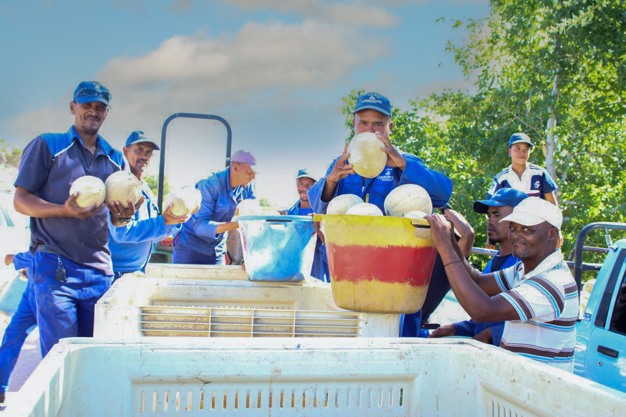Lemoenpoort Farm has been in the Viljoen family for over 190 years. Pieter Viljoen and his wife, Christine, are the sixth generation of the French Huguenot family at the helm of the Breede River Valley farm in South Africa, which, along with wine grapes, is increasingly growing pears, watermelons and melons.
Their grapes are bottled exclusively by BC Wines. When alcohol sales were banned in South Africa during the COVID-19 pandemic, wine prices dropped significantly. "Now we get about R8 to R9 per liter, but that fell to R5 during the pandemic. The bottles were far more expensive than the wine they held," Pieter remembers.
Pieter and Christine Viljoen
That is why the company further expanded its fresh fruit cultivation. Besides its 120 hectares of wine grapes, the farm now grows 20 hectares of bicolored pears (Forelle and Cheeky) and 10 hectares of melons and watermelons. To ensure stable and quality grape harvests, five to seven hectares of wine grapes are annually replaced with young vines. To cut costs and save water, thus reducing the carbon footprint, the company is growing melons among the young vines of one year old. Pieter is affiliated with Tru Cape to market the pears and sells the watermelons and melons himself on the farm to brokers and via local stores.
Pieter remarks that growing fruit is different from growing wine grapes. "Thanks to the harvesters, we easily harvest 100 tonnes of wine grapes per day. The fruit all has to be picked by hand and is, thus, far more labor intensive. That also hinders large scaling up. For example, you have to harvest Forelle pears within three weeks in February. Growing fruit is more profitable, though, and, as a grower, you see that money far quicker. With wine grapes, you have to wait up to 18 months."
The watermelon harvesting was done by the time we visited the farm in early January. "In South Africa, melons are mostly harvested in the summer. So, the harvest window from early December to the first week of January is perfect, because of the festive season and many holiday visitors at the coastal towns nearby. South Africans only want red, sweet watermelons," says the grower who managed to harvest a record watermelon of 28 kilograms this year. "The advantage with melons is that since we sell them locally, we have zero transportation or packaging costs. Pears, on the other hand, aren't eaten as much in South Africa and go all over the world. We market them through Tru Cape in places like the United States, China, Japan, and Europe."
The lack of water is this family business's biggest challenge. "We get, on average, only 200 mm of rain per year here. We use drip irrigation sparingly, but it's still difficult," Pieter explains. The area's high temperatures are another obstacle. "We tried - unsuccessfully - to grow apples. That works in places like Grabouw or Ceres, but not here. We uprooted all those trees."
The company's wine grapes are Fairtrade-certified. "Our workers get those premiums in full via Fairtrade wine sales. Though we personally get no financial compensation, we do benefit financially due to the cellar getting better wine prices. What is important to us is that it puts us in a position to help and finance community projects. We have families who've been working for us for generations. We have as many as 15 projects, ranging from schooling to a crèche for our workers' children to our 'Bee blessed Beeswax Wraps' project. This is run by women that gain educational outings and workshops to broaden their horizons across the board," Christine concludes enthusiastically.

These Fairtrade activities fit in well with the Afrikaans saying hanging in their office: 'Dis nie geluk wat ons dankbaar maak nie, maar dankbaarheid wat ons gelukkig maak' ('It's not happiness that makes us grateful, it's gratitude than makes us happy'). For now, the future of Lemoenpoort Farm seems secure. Of Pieter and Christine's three children, the eldest daughters are planning to start their Agriculture studies in two years time. Those interested in more than their wine grapes, pears, and melons can visit their guest farm, De Goede Hoop farmstead, which, with four rooms, can accommodate eight people, which is a perfect destination for families and also a function/wedding venue, only an hour and a half away from Cape Town.
For more information:
Pieter Viljoen
Lemoenpoort
Tel: +27 082 835 7672
[email protected]
https://degoedehoopfarmstead.co.za/the-farm-lemoenpoort-worcester/










